
DIPLADENIA RIO PINK 20cm / 200mm
This is a woody plant that produces trumpet shaped flowers on top of shiny, elliptical foliage. Adding to the attraction, Sanderie's pink-red flowers have distinctive orange throats. Also known as Brazilian Jasmine this plant can reach up to 15 ft, making it a great choice if you have lots of space to fill.

Rio Dipladenia My Favourite Rio Dipladenia
Flower Gardens How to Grow, Propagate, and Care for Dipladenia This increasingly popular flowering plant does well in hanging pots and butterfly gardens. Here's everything you need to know about helping yours thrive. By Alyssa Brown Published on April 8, 2020 Photo: Getty / Eva Lechner

Dipladenia Rio Pink Four Seasons Nursery
Here are a few guidelines for growing Rios: Light exposure: Blooms best in full sun, a minimum of 4 hours of direct sunlight per day. Planting: Plant at same depth of soil as in the pot - in beds arrange plants 20 to 30 cm (8" to 12") apart. Height: Grows 30 to 60cm (12" to 24") in height. Watering: Allow soil to dry out in between watering.
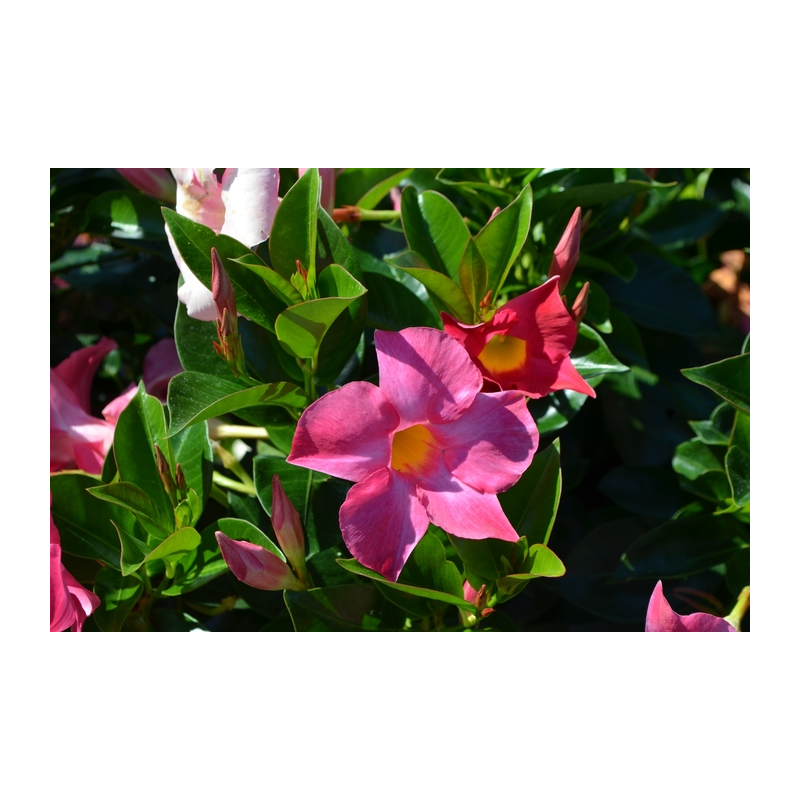
Dipladenia Rio Pink
Growability: Easy to grow Grow Zone: USDA zones 9-11 Size: Can grow up to 10′ feet tall Flowering: Blooms from spring to fall with trumpet-shaped flowers in shades of pink, red, and white Light: Full sun to partial shade 6 hours of direct sunlight daily recommended Humidity: Prefers moderate humidity
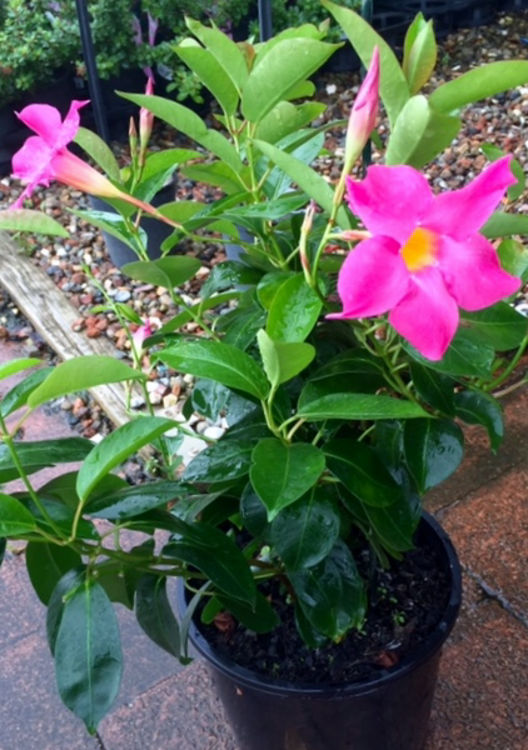
Dipladenia hybrida Rio Pink Wholesale Nursery Nurseries in Melbourne, Sydney & Brisbane
What is Rio Dipladenia? A tropical vine featuring lush, dark green foliage and pink, white, orange, or red trumpet-shaped flowers, Rio Dipladenia thrives in zones 9 through 12. This plant is native to Brazil but can be found in other parts of South America, as well as Mexico, Central America, and the southern portion of the U.S, too.

Pin on Rio Dipladenia Blooms
Its leaves are deep green and glossy, pointed, and somewhat narrow, which only makes it more attractive. Rio Dipladenia Facts There's been a lot of fuss about whether or not Dipladenia and Mandevilla vines are the same thing. Well, they are, and they aren't at the same time! Dipladenia was a separate genus, but now it is the same as Mandevilla.
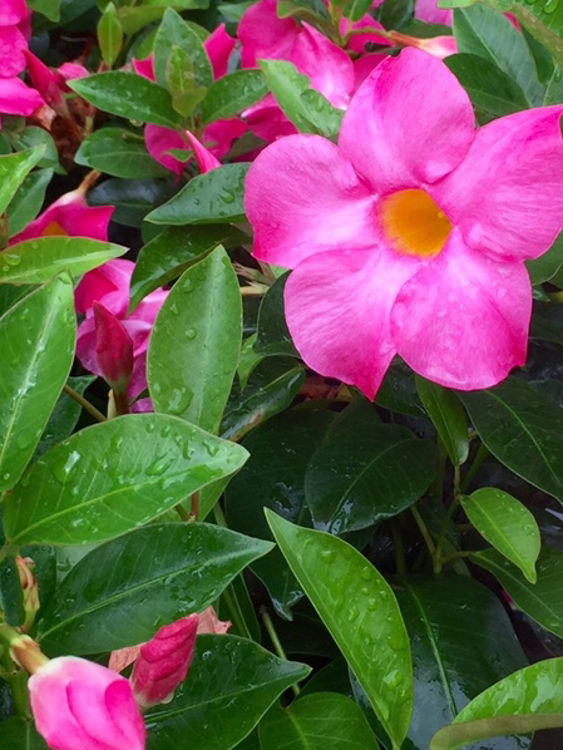
Dipladenia hybrida Rio Pink Wholesale Nursery Nurseries in Melbourne, Sydney & Brisbane
Dipladenia is a bushier plant whose stems grow down and hang. The two plants have similar brightly colored flowers, but mandevilla has a larger flower typically in red. Both plants need the same bright light and dipladenia care is the same as that for the mandevilla vine.
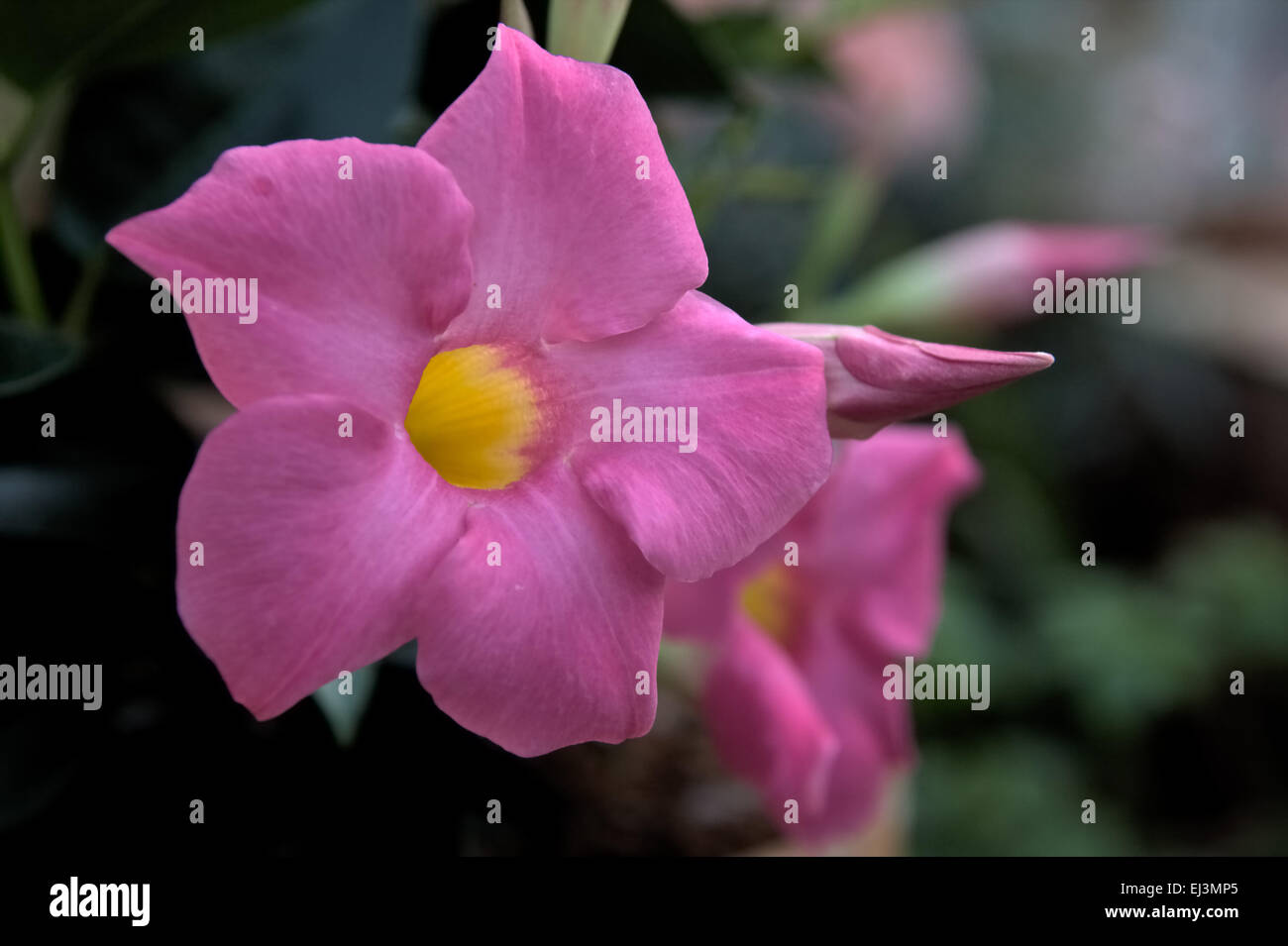
Dipladenia syn. Mandevillea 'Rio Pink' Stock Photo Alamy
0.8 cups. every 9 days. Dipladenia 'Rio' needs 0.8 cups of water every 9 days when it doesn't get direct sunlight and is potted in a 5.0" pot. Use our water calculator to personalize watering recommendations to your environment or download Greg for more advanced recommendations for all of your plants. Water 0.8 cups every.
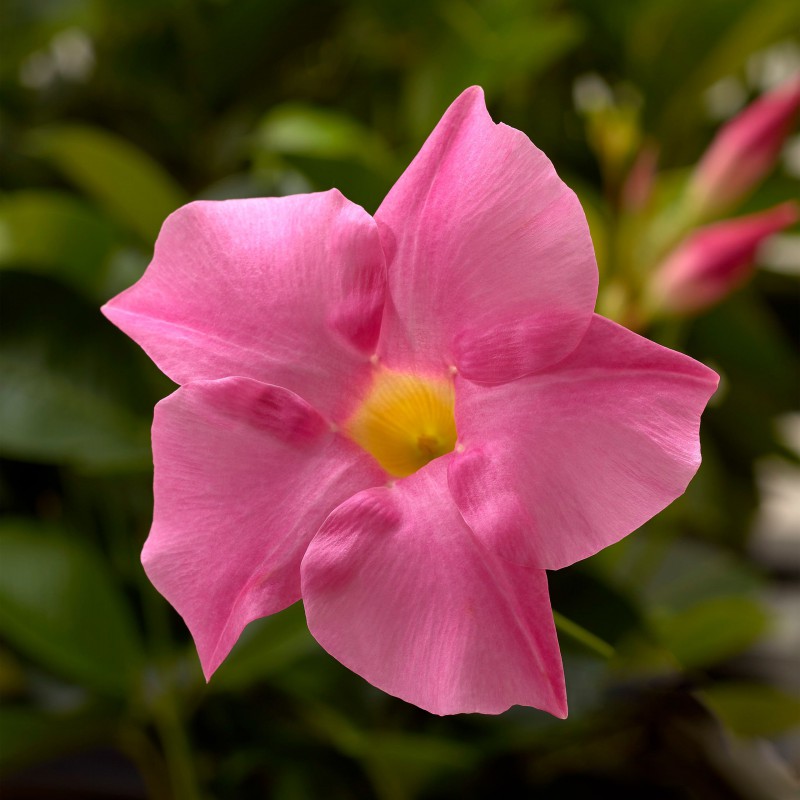
Dipladenia 'Rio® Pink' GardenPlant
Basic Care It's fairly easy to take care of Rio Dipladenia. This plant tolerates drought and has a rest period that lasts from October to April. Taking care of Rio Dipladenias is simple and the routine doesn't differ from most easy-to-care-for plants. This eye-catching flower is also heat tolerant!
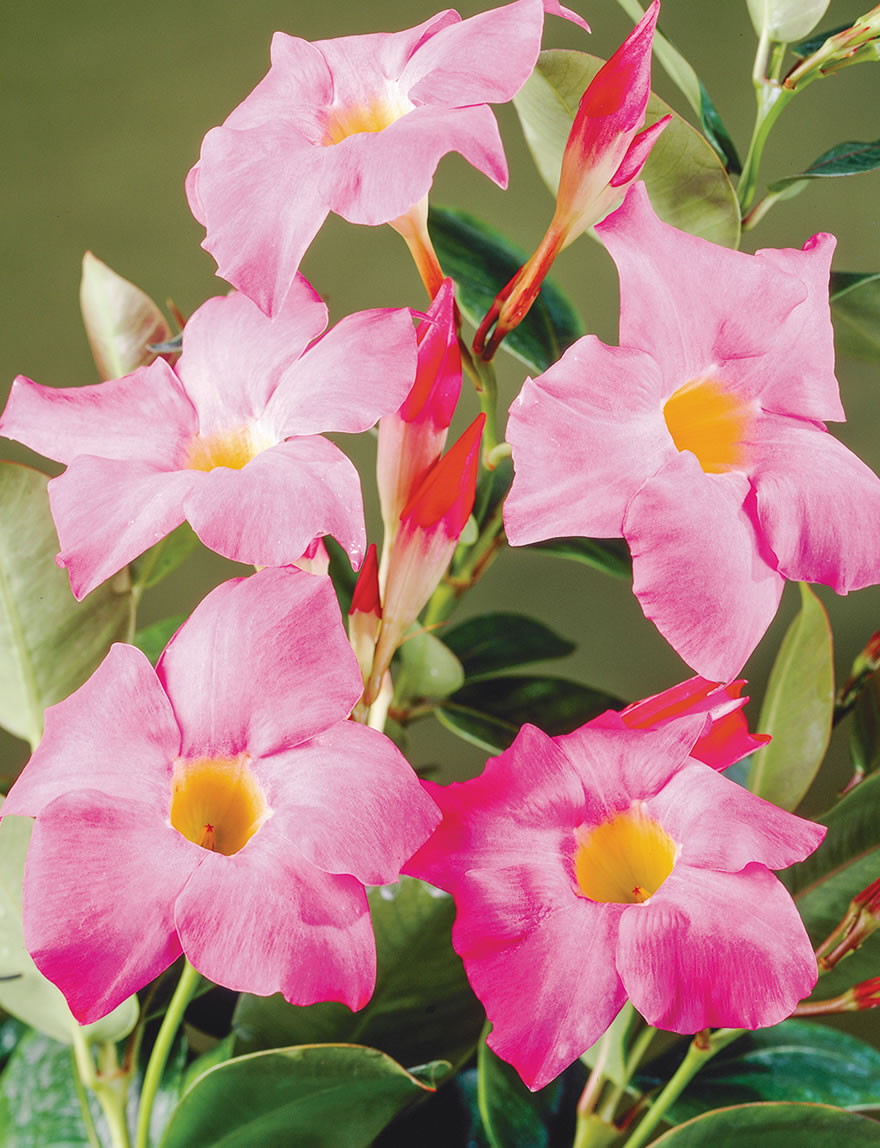
Dipladenia Rio Pink Tesselaar
Dipladenia sanderi is also known as Brazilian Jasmine or Rio Dipladenia. These plants grow vertically up to 15 feet tall.. The lovely pink blooms are double the size of most mandevilla flowers, at roughly 4 inches wide. Sun Parasol is the perfect container focal point on a porch or fence. Like other mandevilla vines, it needs a trellis for.
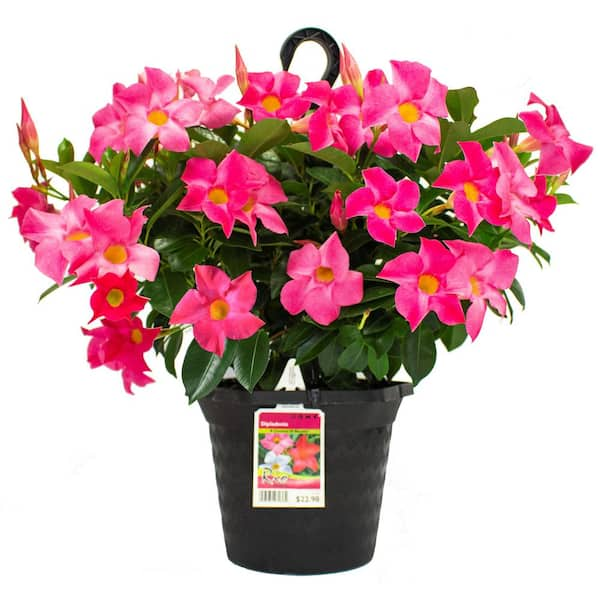
Rio 1.15 Gal. Hanging Basket Dipladenia Flowering Annual Shrub with Pink Flowers 272499
Rio Dipladenia has beautiful, deep green, glossy leaves and produces large, beautiful, sweetly scented trumpet-shaped blooms from spring to autumn in shades of white, pink, raspberry, and red. Flowers are abundant and perky, even in the hottest and most humid circumstances. Light And Temperature

Pink Rio dipladenia container garden, dracaena spike centre for height. Outdoor Flowers, Outdoor
Rio Dipladenias are perennial plants that will stay alive and green all year round if you grow them in frost-free weather and provide them with full sun. But if you want to grow Rio Red Dipladenia in cold regions, know that they will behave as annuals. Rio Pink Dipladenia:
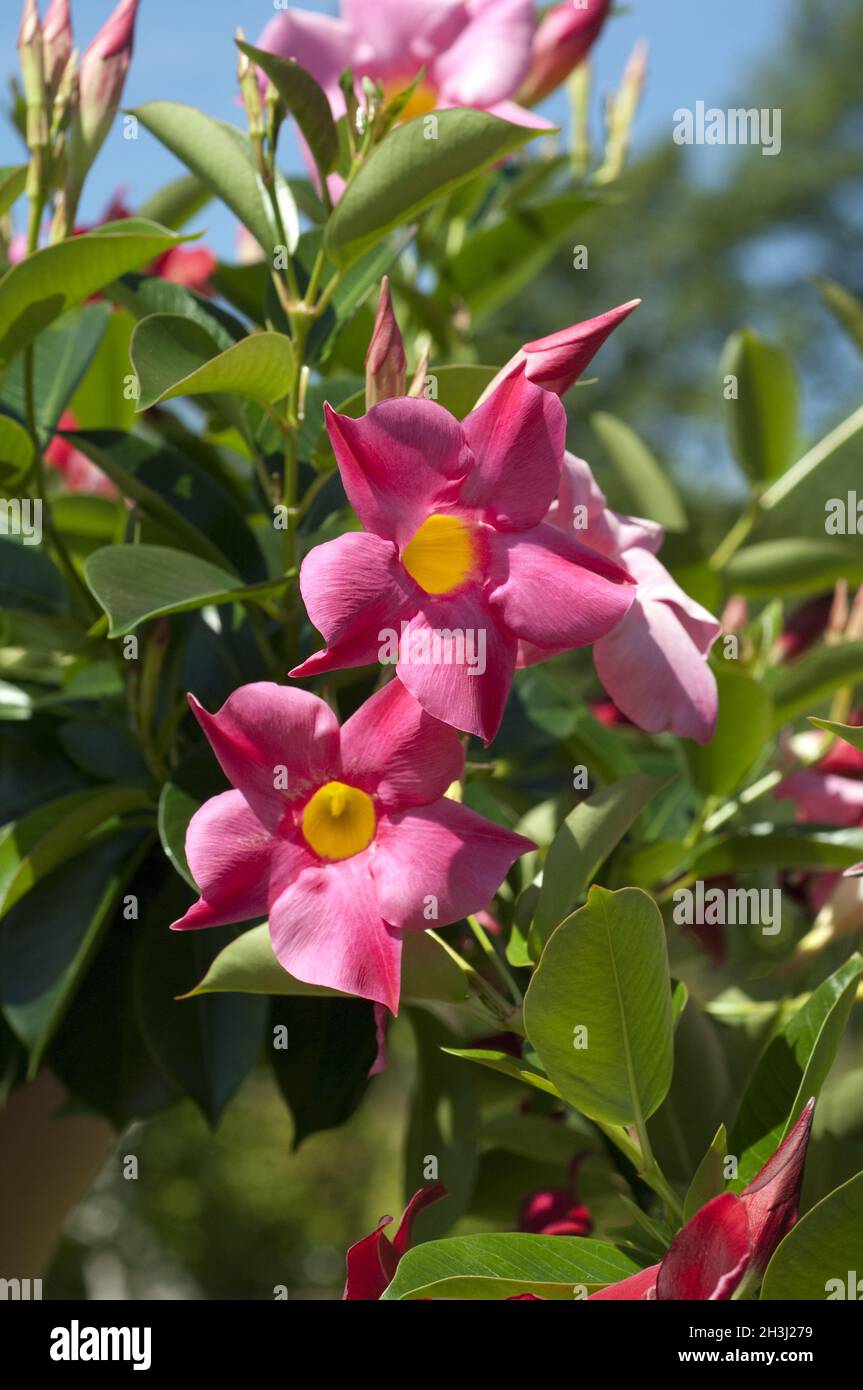
Dipladenia, Rio Hot Pink, Mandevilla hybrid Stock Photo Alamy
Free 2-day Shipping On Millions of Items. No Membership Fee. Shop Now!
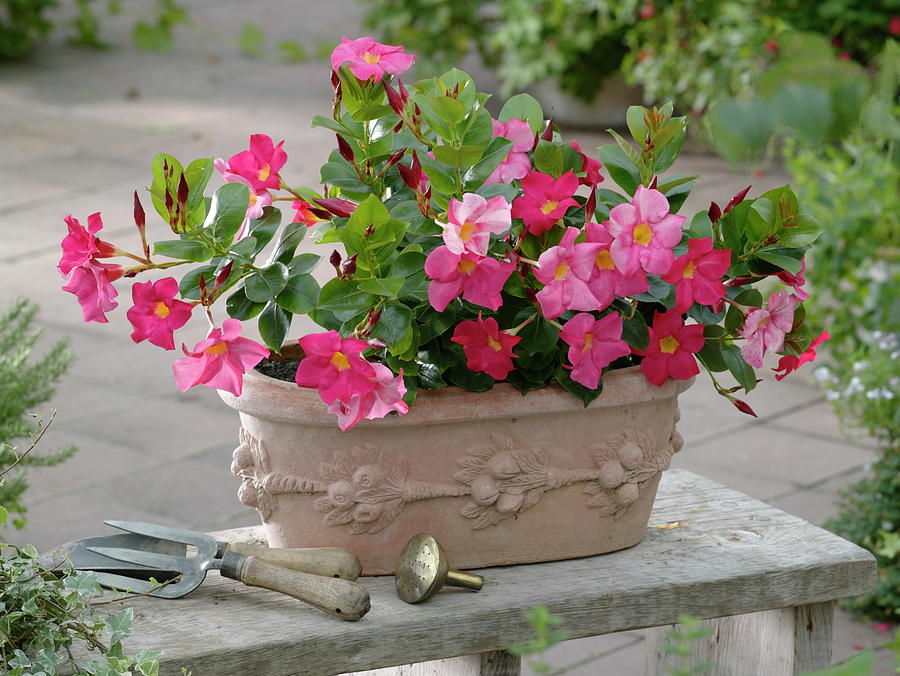
Dipladenia 'rio Pink' In Terracotta Jardiniere Photograph by Friedrich Strauss
It comes from South America, especially Brazil. It has a fancy scientific name, Dipladenia sanderi, which honors a special person who introduced it to the world. What the Rio Dipladenia Looks Like and How It Grows? The Rio Dipladenia plant is like a nature superstar! It's not too tall, usually around 1 to 2 feet.

Pink blooming Rio Dipladenia hanging basket Hanging baskets, Bedding plants, Tropical climate
Pinch off any leggy growth when your plant is still young, as this will promote the growth of thicker, stronger branches. If possible, try to provide your dipladenia with a stake for support as it matures. Fertilise your plant every three to four weeks during the growing season. A liquid plant food is best as it penetrates deep into the soil.

Dipladenia Rio Pink
Dipladenia is a shrub-like plant having a bushy appearance with its stems trailing downwards. In contrast, Mandevilla plants are climbing up. It does need a support structure like a pole or stake. Both plants produce colorful blooms in red, pink, or white.